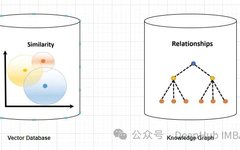Understanding the Main Technologies of Knowledge Graphs
Introduction: The main technologies of knowledge graphs include knowledge acquisition, knowledge representation, knowledge storage, knowledge modeling, knowledge fusion, knowledge understanding, and knowledge maintenance. The main technologies of knowledge graphs include knowledge acquisition, knowledge representation, knowledge storage, knowledge modeling, knowledge fusion, knowledge understanding, and knowledge maintenance. These seven aspects support the construction of knowledge graphs from … Read more








